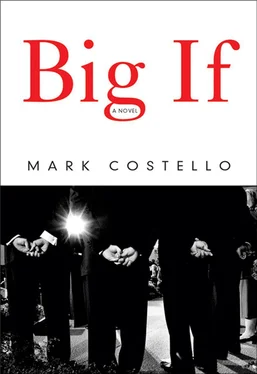He looked up at the trees. When he came with Kai, Jens showed him all the bedrooms, here is Auntie Vi’s (Kai barely knew her), here is Grampa Walter’s (Kai knew him as a person in a picture) and Grammy Evelyn’s (Kai knew her as the lady who sent oranges from Florida), and the highlight of the tour, Jens’ own boyhood bedroom. Kai would climb up on the bed and bounce. “Poppa, look!” he’d shout and crack his little skull against the eaves, just as Jens had in the glory days of beds and bouncing. Other times, as now, Jens came out alone to walk the lawn and listen to the wind stirring in the cat grass of the marshes, a sound like faraway applause.
Jens fetched the bottle of Glucola from the car and took a walk. The grass was February brown. His mother’s garden, her ex-garden, untended since the summer Walter passed away, was a patch of dirt and dried weeds down to the climbing roses, which hung heavy and would bloom again in May, though nobody would notice. Jens remembered the battle over tulips in the den, Evelyn and Walter, and Walter always lost. He remembered Evelyn feeding slop to dogs, Dingo I, Dingo II, Dingo III, a dynasty of Dingos in the yard, and Walter up late with his pipe, reading back issues of Shop Safety Monthly , and writing on his money, IN  WE TRUST, IN US WE TRUST. Center Effing didn’t understand his father, the godless moderate Republican, a radical of large ideas whose life, paradoxically, was bounded by this town, by the rhythms of his habits in this town, poplin suits in summertime, a haircut every week. People understood Walter as the plodding adjuster, not as the eccentric atheist. Jens saw it the other way. He understood the atheism (Walter said, We’re merely molecules — why is that so frightening? ), but not the insurance work, Walter as enforcer of the letter of the policies, ten thousand dollars for a foot, thirty thousand for an eye. If Walter could see the lies of scripture, why couldn’t he see the lies of the loss-and-compensation charts devised by The Connecticut? Why was an eye worth thirty thousand dollars, not twenty and not forty? Walter wouldn’t buy into the lie of the motto printed on his money, yet he went about adjusting, serving The Connecticut, buying into a much bigger lie, or so it seemed to Jens.
WE TRUST, IN US WE TRUST. Center Effing didn’t understand his father, the godless moderate Republican, a radical of large ideas whose life, paradoxically, was bounded by this town, by the rhythms of his habits in this town, poplin suits in summertime, a haircut every week. People understood Walter as the plodding adjuster, not as the eccentric atheist. Jens saw it the other way. He understood the atheism (Walter said, We’re merely molecules — why is that so frightening? ), but not the insurance work, Walter as enforcer of the letter of the policies, ten thousand dollars for a foot, thirty thousand for an eye. If Walter could see the lies of scripture, why couldn’t he see the lies of the loss-and-compensation charts devised by The Connecticut? Why was an eye worth thirty thousand dollars, not twenty and not forty? Walter wouldn’t buy into the lie of the motto printed on his money, yet he went about adjusting, serving The Connecticut, buying into a much bigger lie, or so it seemed to Jens.
Jens was looking at the beech tree in the corner of the yard, remembering the day Walter bought a half-dipole antenna, every hammer’s envy, and how they puzzled over where to rig it. It was a powerful antenna, but it needed to be high. Then Major Wade, the grounded bomber pilot, wandered over from the Coopers’ pool followed by good old Mrs. Cooper, the Asplunds’ frowsy neighbor, whose tits and exhibitionism had hastened puberty in Jens by at least two years. Major Wade, the man who shot the arrow through the tree, came down to the basement a few times after that. He would sit with Jens at the console, drinking a beer, taking a break from Carol Cooper’s conversation. Wade would fiddle with the dial and say, “Can you get Greenland on this thing?” Jens could get the world with his dipole on a good hot afternoon when the waves were skipping, a weird effect. On days like that, he could get Uganda on the ten-band, but not his buddies up the shore. It had to do with solar radiation, poison atoms in the air fifty miles up. Major Wade, as a bomber pilot, knew all about fallout in the stratosphere, although he didn’t ham and couldn’t fly anymore. He had a beer and a headache and an inner ear infection and had been reassigned as base recreation officer. He enjoyed various base recreations, but was finished as a bomber pilot.
Carol Cooper sunbathed on her diving board all summer. Jens watched her brown herself all day, or swim at midnight, drunk and alone, when Major Wade was off with other wives. Jens stayed up late, spying on Carol Cooper, or reading weather books or his hammer magazines as he listened to the Red Sox in Anaheim or Oakland (the games would start at ten and run until one or two). If a bomber left at night, he’d listen on his pillow as the rumble dwindled. Jens knew the sound of every plane at Pease, the B-52s, the swept-wing supersonic F-111s. Rumbling was bombers, heading north and east. Listen for the sound. Was it gone? Was it absolutely gone? Was there nothing in the room again but play-by-play and moths against the screen and Carol Cooper, sloppy drunk and stumbling over a chaise longue? Even half asleep or jerking off, you couldn’t mistake the bombers for the hairy exits of the fighter-interceptors, the F-111s, a sound like Christmas wrapping tearing and the man-made thunder at Mach One. Every house Jens ever saw, or visited, or stayed in, anywhere in Portsmouth or the shore, had the same ceiling cracks from the sonic booms. When the nights were quiet, Jens knew that the squadron had left for Thule in Greenland, their forward-ready base under the ice cap. Major Wade, grounded and depressed, talked about Thule, flying out of Thule, the endless whiteouts and snow-blindness, compass spinning as you hopped the pole, arctic lows depressing the altimeter. You’re blind and your instruments are giving impossible readings — you’re flying at zero feet and everywhere is north. The first runway at Thule was black asphalt, but the color black stored heat from the sun, melting the permafrost, and one day the Greenland ground swallowed up the runway. The Air Force built a new runway, bigger than the first, bigger than the lakebed macs out west, said Major Wade, biggest on the planet maybe, five miles of paved tundra, and it was painted white to bounce the light and not melt the permafrost, and the pilots coming back from the Russian aerial frontier had to search for white in whiteness, which was the same as being blind.
Jens talked on the half-dipole to a man in Kansas who was sitting in the path of a cyclone. They weren’t talking, of course. They were tapping Morse, Jens sitting in the basement, speaker to his ear, straining for each dit and dat, jotting as he strained. As the wind picked up in Kansas, the man keyed faster and faster until Jens was jotting without thinking, without translating, and then the cyclone hit and the man went silent. Jens translated the last lines of dots and dashes, the last broadcast of the martyred Kansas hammer, and the man said this: Two of them. They glow. Jens, alone at the console, let the pencil fall. Being a scientific kid, he knew that twin cyclones were comparatively common. He also knew that cyclones did on rare occasions glow. Rustics had reported this for centuries, but scientists had written it off as terror playing tricks on rustics, a known phenomenon, until it was shown that the vicious spinning sheer of a twister system can actually create a battery in air, building up a charge, and so the funnel glows. Some weather historians believed that these freaks of freaks, self-electrifying cyclones, might have been the source of Bible stories about God-as-fire, pillars of fire, tongues of fire, burning bushes burning unconsumed. Jens let the pencil fall that day and thought, I’ve seen it through Morse code, I’ve touched the lie of God.
Ham radio and Morse — they were his two loves back then, the twin cyclones of his heart. But, looking back, he saw that they were part, one part, of a youth-long preparation for Jens’ shattering encounter with the true God: software. Like the God of Israel, it went by many names, one for every face it showed: logic, code, loop, routine, algorithm, source. JENSISNUMBER1—he remembered how it made him feel, the power and control, making the computer an extension of your will. He mastered Beginning Glyph and moved up over time, climbing to the realms of high abstraction, polymorphic logic. He left Dartmouth burning with ambition to build and write cool things, beauties made of code. He went to Harvard on a fellowship to do stochastic math, but the fellowship ran out, and then he did a Ph.D. at MIT, but he fought with his adviser and left after a semester, and then there was a series of start-ups with big dreams, but one thing happened or another, and Jens found himself five years farther down the road, married with a mortgage, Peta pregnant, and Jens again without a job, and so he started writing monsters for BigIf.
Читать дальше

 WE TRUST, IN US WE TRUST. Center Effing didn’t understand his father, the godless moderate Republican, a radical of large ideas whose life, paradoxically, was bounded by this town, by the rhythms of his habits in this town, poplin suits in summertime, a haircut every week. People understood Walter as the plodding adjuster, not as the eccentric atheist. Jens saw it the other way. He understood the atheism (Walter said, We’re merely molecules — why is that so frightening? ), but not the insurance work, Walter as enforcer of the letter of the policies, ten thousand dollars for a foot, thirty thousand for an eye. If Walter could see the lies of scripture, why couldn’t he see the lies of the loss-and-compensation charts devised by The Connecticut? Why was an eye worth thirty thousand dollars, not twenty and not forty? Walter wouldn’t buy into the lie of the motto printed on his money, yet he went about adjusting, serving The Connecticut, buying into a much bigger lie, or so it seemed to Jens.
WE TRUST, IN US WE TRUST. Center Effing didn’t understand his father, the godless moderate Republican, a radical of large ideas whose life, paradoxically, was bounded by this town, by the rhythms of his habits in this town, poplin suits in summertime, a haircut every week. People understood Walter as the plodding adjuster, not as the eccentric atheist. Jens saw it the other way. He understood the atheism (Walter said, We’re merely molecules — why is that so frightening? ), but not the insurance work, Walter as enforcer of the letter of the policies, ten thousand dollars for a foot, thirty thousand for an eye. If Walter could see the lies of scripture, why couldn’t he see the lies of the loss-and-compensation charts devised by The Connecticut? Why was an eye worth thirty thousand dollars, not twenty and not forty? Walter wouldn’t buy into the lie of the motto printed on his money, yet he went about adjusting, serving The Connecticut, buying into a much bigger lie, or so it seemed to Jens.










